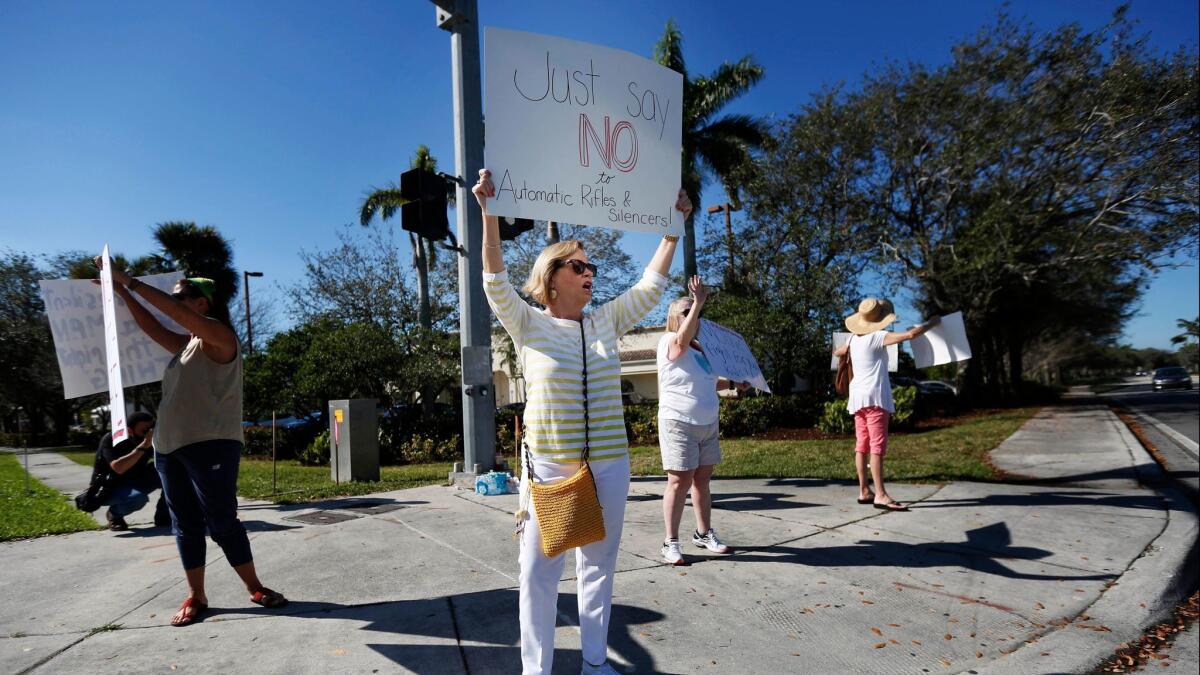Op-Ed: We already ask too much of teachers. Don’t ask them to take on kids with guns

- Share via
Over the past weeks, the steadfast demands of the Parkland, Fla., students have resounded through the suburban Oregon high school where I teach visual arts. A group of senior girls, spurred to action by the horrors at Marjory Stoneman Douglas High, organized a walkout of their own. I listened as the students shouted demands for safer schools and an end to fear in the classroom. Though deeply proud of the protesters, I was confronting a brutal reality: Neither my students nor I feel safe at school.
The shootings just keep happening. When will it be our turn? When will despair take the shape of a teenager with a gun and turn our school into a shooting gallery?
We’ve been practicing the drill for years. We lock and block the doors, throw the light switch, then huddle on the floor in the darkest corners of the classroom — 36 teenagers and one adult trying to be as quiet as possible. We wait for the rattle of the door handle, and then it’s over. The all-clear.
I tell a joke, try to change the mood and resume class. One grim effect of these procedures, though, is the normalization of a threat so abnormal it’s hard to take in. We’ve desensitized ourselves to the true horror of what we’re playing out. I hope the students grasp the seriousness of the drill and don’t internalize the fear. But they can’t help themselves, and neither can I.
At the beginning of the semester, I gave my new students a questionnaire. I asked them: “What really stresses you out?” One answer: “That I might die in this building.”
I cannot convey what it’s like to walk into your workplace every morning wondering if today is the day. I cannot explain the trepidation I feel when I have to confront that student — the one making the disturbing art, who doesn’t smile or interact with his peers — to tell him he needs to tone down the violence in his work. Is this the kid who will come back for me later, armed and ready to exact his revenge?
Dear America: You’ve given me an impossible task and condemned me for my failure to perform it.
I imagine all new teachers start their careers ready to take a set of ragtag students from disarray to academic excellence. If you’re going to make it in the system, however, that illusion must be shed. Almost a third of new teachers jump ship by year three, when the challenges of the profession — the long hours, the constant planning and grading, the never-ending worries about meeting your students’ needs — become unsustainable.
In my first years on the job, my commute home often felt like a therapy session sans therapist. I’d replay every missed opportunity, every interpersonal challenge, and then I’d cry. I couldn’t reach everyone. Part of teaching would always be about failure: failure to connect, failure to notice, failure to address the nuanced and specific needs of all the students. It was a numbers game I would always lose, and a truth I had to embrace to become a more effective educator.
Nevertheless, the archetype of the teacher-martyr — toiling into the night, capable of reversing any tide, superhumanly counteracting the problems of our society — is what we’ve bought into as a culture. And post Parkland, isn’t taking a bullet the ultimate expression of this archetype?
I’m awed by the teachers at Stoneman Douglas who died to save their students’ lives. But I question the motivations of those, including the president, who hold them up as icons. Valorizing teachers as saviors is easier than honoring the profession in ways that actually matter. Heroes don’t need smaller class sizes or adequate retirement accounts. The truth is, those teachers should never have had to put their lives on the line for their students. It wasn’t their job. We are not warriors, we are teachers.
This year of classroom teaching has been the most demanding of my life. Not because of the subjects I teach, my class sizes or workload, but because of the mounting unhappiness of my students. So many admit to depression and anxiety, or express a simmering dread about the future. And how can I argue with that? When you regularly crouch in the corner of a dark classroom, practicing for your own death, it’s difficult to hope.
I no longer naively dream of changing the lives of each of my students. My goals have narrowed: to get them invested in learning, to listen, to be their advocate (especially for the most marginalized), to create a space for inquiry and expression. If I do that well, I’ll at least help them find their own voices. But believe me, it’s a Sisyphean task. They’re teenagers after all.
School is the place where they experiment with the lofty promises of the American Dream, and we ply them with the message that they can be anything, do anything. Study hard, make friends, find your path and your talent and the world will be yours for the taking. But what if all that proves remarkably out of reach? And what if school, no matter how hard we try, is just a relentless reminder of failure, not possibility?
For some the emotional stresses are too heavy, the hurts too great, their invisibility too complete. Can anyone be surprised that the most disgruntled, the ones who thought the dream was tailor-made for them, return to the institution that let them down, bringing their disillusion with them -- and sometimes an AR-15. Pulling the trigger is the last act of personal agency these boys (and so far they are all boys, and most of them white) have to offer.
Dear America: You’ve given me an impossible task and condemned me for my failure to perform it. Now, you — or at least the president, the NRA and various politicians — assure me that I can redeem myself by holding a gun, firing back and blasting away the despair. But I will not hold that gun and I cannot be that shield. I can’t figuratively save my students and I can’t physically save them either.
We ask too much of teachers, schools and children. Some students may thrive, many more survive, but that doesn’t make the world we’ve built any less dangerous or difficult. We’re sacrificing our children for the sake of false promises, and we wonder why they keep coming back with guns in their hands.
Belle Chesler teaches in Beaverton, Ore. A longer version of this essay appears at TomDispatch.com.
Follow the Opinion section on Twitter @latimesopinionand Facebook
More to Read
A cure for the common opinion
Get thought-provoking perspectives with our weekly newsletter.
You may occasionally receive promotional content from the Los Angeles Times.










